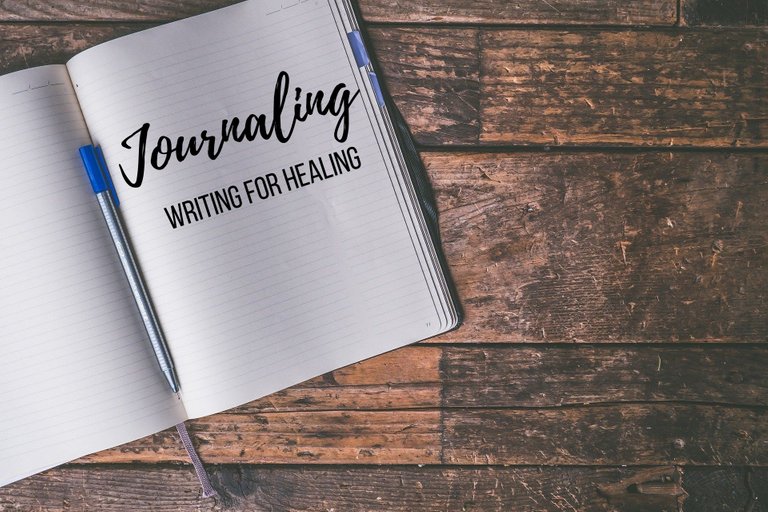
Fuente de imagen | Edición hecha por mi

Ya he hablado de este tema antes, cuando estaba comenzando en Hive. Pero estarán de acuerdo conmigo en que es un post muy viejo y que es bueno actualizarse en ciertas cosas. Yo no soy psicóloga ni nada parecido, simplemente investigo por aquí y por allá, tomo lo que me gusta y les comparto lo que a mi me funciona. Mi psicóloga dice que es una buena terapia y que me puede ayudar a sanar más rápido mi alma, dice que es bueno expresarse para uno mismo y conocerse mejor.
Así que este es el primero de una serie de artículos en los que estaré hablando de escritura terapéutica o Journaling.

Así que ¿Qué es el Journaling? Tal como el título lo indica es escritura para sanar. La práctica en si no tiene ciencia, se trata de tomar un cuaderno y escribir cualquier cosa que pase por tu cabeza (tus pensamientos y sentimientos), pero al final del día si tiene un poco de ciencia.
¿Para que sirve? En mi caso es como tener una conversación conmigo misma. Incluso a veces le escribo a la Oriana del futuro expresándole mis deseos, le digo que quiero que haga y ella lo hace porque yo (La Oriana del pasado para ella) se lo digo.
Esta es una actividad que ha sido categorizada como infantil, pues es muy común en los niños y sobre todo en las niñas tomar un cuaderno y comenzar a escribir:
"Querido Diario, el chico que me gusta se sentó a mi lado en el recreo hoy"
"Querido Diario, hoy hice una nueva amiga en la escuela"
No sé por que pero cuando vamos creciendo lo vamos dejando y no deberíamos. Tal vez esa sea la razón por la cual los niños son tan creativos, porque se expresan.

Les contaré mi historia al respecto. Siempre he tenido diarios donde escribir mis pensamientos y cuando era niña escribía todos los días, es divertido y nostálgico sentarse a leer los pensamientos de una Oriana de 8 años. Luego entré en la adolescencia y como se imaginarán el hábito fue disminuyendo, aunque aún conservaba mi diario para escribir una o dos veces al año. Fue allí cuando comenzaron mis problemas de salud mental y el no saber que sentía, me sentía triste y deprimida pero no sabía porque y eso me frustraba aún más, cosa que pude ahorrarme con un buen hábito de journaling.
Realmente este año fue que pude retomar el hábito de manera mucho más constante con la llegada de la cuarentena y me ha ayudado a sobrellevar un poco el encierro aunque no ha sido nada sencillo.
Así que sus beneficios son muchos:
- Te permite expresar sentimientos reprimidos
- Te conoces mejor a ti mismo
- Ordenas tus ideas
- Trabajas por el alcance de tus objetivos
- Estimulas tu creatividad

Pues, vas a necesitar al menos tres cosas: Un cuaderno, un lápiz y tus ideas. Puedes escribir sobre tu día, tus sentimientos y tus planes para el futuro. Para que esta terapia sea realmente efectiva debes ser completamente honesto, recuerda que tu diario se va a convertir en tu espacio personal para soltar tus cargas.
Es importante que no te juzgues a ti mismo en el proceso. A veces yo escribo cosas que luego me da vergüenza leer pero que en el momento sé que necesitaba plasmar en algún sitio, así que me dejo ser y lo acepto.
También podrías variar un poco tu manera de escribir para motivarte. Usa colores y marcadores diferentes para darle tu estilo propio, haz dibujos sobre tu día, pega recortes y exprésate.
Para cultivar el hábito es importante que tengas un momento de tu día para escribir, puede ser incluso en la hora de almuerzo del trabajo. Llevarte tu diario a todos lados puede ser muy provechoso, tal vez las mejores páginas son las que harás fuera de casa, sentada en el parque viendo los árboles o en la parada del autobús viendo a las personas.

Esto fue todo por esta primera parte de mi serie de Journaling, espero que les haya gustado y que se animen a empezar esta terapia.
¡Nos vemos en un próximo post!
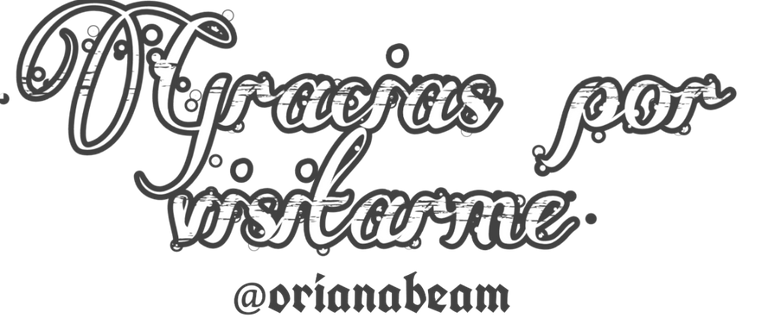
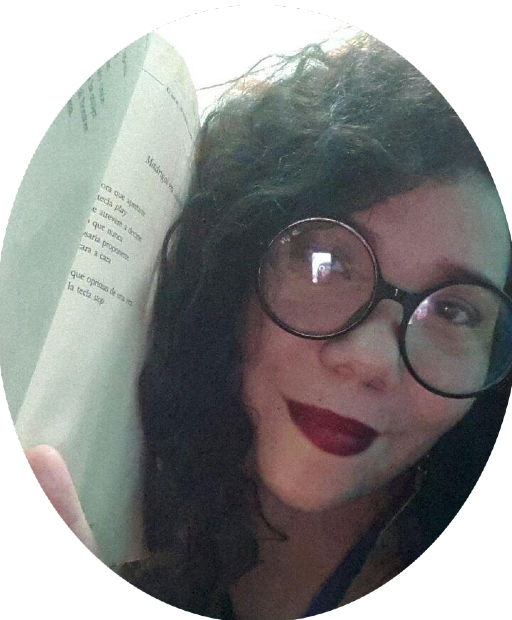
O R I A N A
Estudiante de Comunicación Social.
Creadora de contenido digital.
Amante del arte, la música y las Ciencias Sociales.
ENCUENTRAME EN:
TWITTER | DISCORD | INSTAGRAM

Image source | Edit by me

I've talked about this before, when I was starting at Hive. But you'll agree with me that it's a very old post and that it's good to get up to date on certain things. I'm not a psychologist or anything like that, I just do research here and there, take what I like and share with you what works for me. My psychologist says that it is a good therapy and that it can help me to heal my soul faster, she says that it is good to express oneself and to know oneself better.
So this is the first in a series of articles that I will be talking about therapeutic writing or Journaling.

So what is Journaling? As the title indicates, it is writing for healing. The practice itself has no science, it's about taking a notebook and writing down anything that goes through your head (your thoughts and feelings), but at the end of the day it does have a little science.
What does it do? In my case it's like having a conversation with myself. Sometimes I even write to the Oriana of the future expressing my wishes, I tell her what I want her to do and she does it because I (Oriana of the past for her) tell her to.
This is an activity that has been categorized as childish, because it is very common for boys and especially for girls to take a notebook and start writing:
"Dear Diary, the boy I like sat next to me at recess today"
"Dear Diary, I made a new friend at school today.
I don't know why, but when we grow up we leave it behind and we shouldn't. Maybe that's the reason why children are so creative, because they express themselves.

I will tell you my story about it. I have always had journals to write my thoughts in and as a child I wrote every day, it is fun and nostalgic to sit and read the thoughts of an 8 year old Oriana. Then I entered my teens and as you can imagine the habit decreased, although I still kept my diary to write once or twice a year. It was there when my mental health problems began and not knowing what I was feeling, I felt sad and depressed but I did not know why and that frustrated me even more, which I could save with a good journaling habit.
This year I was really able to resume the habit much more consistently with the arrival of the quarantine and it has helped me cope a little with the confinement although it has not been easy.
So the benefits are many:
- It allows you to express repressed feelings
- You know yourself better
- You order your ideas
- You work for the achievement of your objectives
- You stimulate your creativity

Well, you're going to need at least three things: A notebook, a pencil and your ideas. You can write about your day, your feelings and your plans for the future. For this therapy to be really effective you must be completely honest, remember that your journal will become your personal space to release your burdens.
It is important that you do not judge yourself in the process. Sometimes I write things that I am embarrassed to read, but I know at the time that I needed to put them somewhere, so I let myself be and accept that.
You could also vary your writing a bit to motivate yourself. Use different colors and markers to give it your own style, make drawings about your day, paste clippings and express yourself.
To cultivate the habit, it is important that you have a time in your day to write, maybe even at lunchtime at work. Taking your journal with you everywhere can be very helpful, perhaps the best pages are the ones you will make outside, sitting in the park looking at the trees or at the bus stop watching people.

This was all for this first part of my Journaling series, I hope you liked it and that you are encouraged to start this therapy.
See you in a next post!


O R I A N A
Mass comunications student.
Digital content creator.
Art, music and social sciences lover.
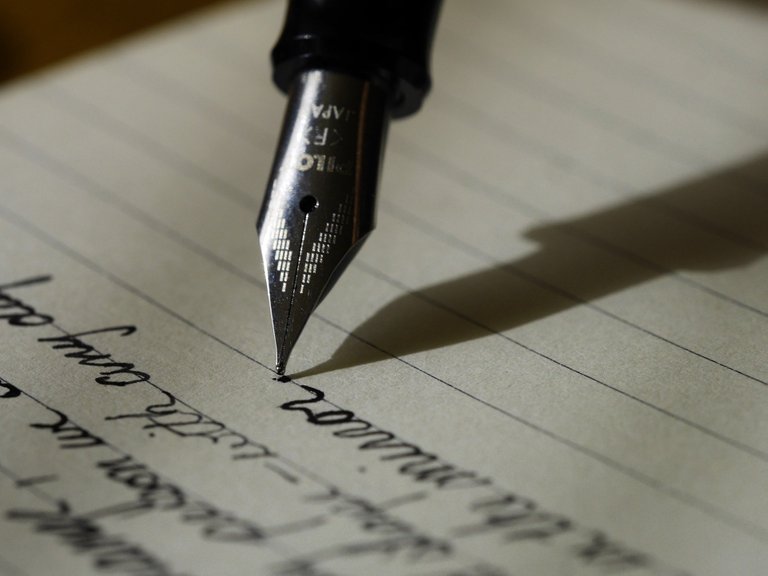 Imagen de
Imagen de  Imagen de
Imagen de 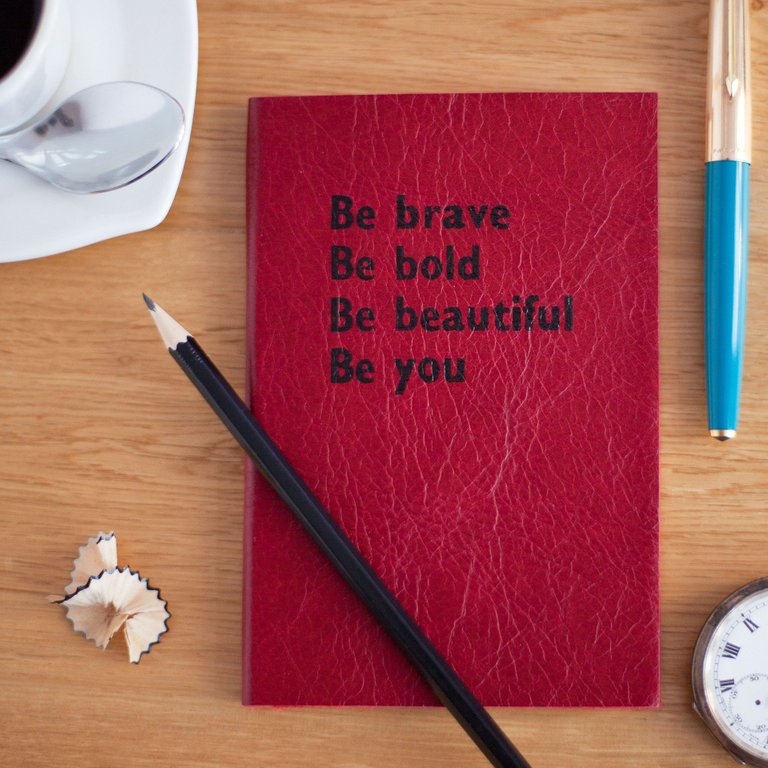 Imagen de
Imagen de
Congratulations @orianabeam! You have completed the following achievement on the Hive blockchain and have been rewarded with new badge(s) :
You can view your badges on your board and compare yourself to others in the Ranking
If you no longer want to receive notifications, reply to this comment with the word
STOPEl escribir es una terapia maravillosa, yo soy de esas personas que acumula cuadernos repletos de ideas, sensaciones, episodios y demás. Y lo más gracioso, siempre que salgo a comprar algo termino llegando con una libreta nueva a mi casa hahaha 😂 me encanta este post y me encanta la idea de que hagas una serie sobre esto, voy a estar muy pero muy conectada con estos posts amiga, muchas gracias por esta iniciativa. ❤️!! Un gran abrazo.
Jajajaja me pasa.
Yo: Oriana ya tienes muchas libretas, ya no necesitas más.
También yo: Pero me hace falta una libreta para pegar etiquetas jajajaja.
Pero si es muy buena terapia y me alegra mucho que te haya gustado el post.
¡Un abrazo!
¡Hola, Oriana! Qué buen post. Me llamó la atención porque comencé está terapia al comenzar la cuarentena.
Me pasó lo mismo que a ti, para mí cumpleaños número 6 pedí un diario, un cuaderno para escribir. Desde ahí siempre mis familiares me regalaban libretas...Creo que eso ha hecho que desarrollará mi escritura (que es muy importante porque quiero ser una escritora). Muchas de esas libretas se perdieron lamentablemente, pero ahora tengo 2 (una que ya terminé y la que tengo) de este año. Los últimos meses he perdido el hábito. Antes escribía todos los días al iniciar el día y ahora como dos veces al mes diciéndome "no tengo ganas", "no tengo tiempo" pero es cierto, escribir me mantenía cuerda, no tenía tantos sentimientos en mí que me pesaban. Debo recuperarlo. Gracias por este post.
PD: Empecé está terapia al comenzar el libro "El camino del artista" te lo recomiendo y lo tengo en PDF!
Posted using Dapplr
¡Hola! ¿Qué tal? Me alegra que te haya gustado el post. Buenísimo lo del journaling si quieres ser escritora, una vez vi un video que decía que para hacer fluir las ideas era bueno escribir 3 páginas todas las mañanas.
¡Sé cual es el libro "El camino del artista"! No lo he leido pero le tengo ganas jajajaja
I agree completely, I have always found writing as a vital part of my healing journey down through the years. Hive itself has become my healing journal. Thanks for sharing your experience and for spreading awareness about this wonderful form of healing.
Curated for #naturalmedicine by @trucklife-family.
Did you know that you can earn a badge from @hivebuzz for posting about #mentalhealthawareness? Read more details here!
We encourage content about health & wellness - body, mind, soul and earth. We are an inclusive community with two basic rules: Proof of Heart (kindness prevails) & Proof of Brain (original content). Read more here.
Our website also rewards with its own Lotus token & we'd love you to join our community in Discord. Delegate to @naturalmedicine & be supported with upvotes, reblog, tips, writing inspiration challenges for a chance to win HIVE and more. Click here to join the #naturalmedicine curation trail!
We also encourage you to follow our sister accounts, @lotusshares and @uplotus for announcements and reblogs.